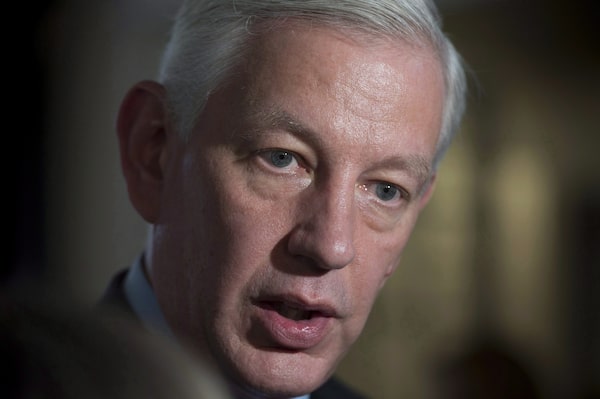
Canadian envoy to China Dominic Barton in Davos, Switzerland on Jan. 24, 2019.Paul Chiasson/The Canadian Press
Canadian envoy to China Dominic Barton is being called as one of the first witnesses to testify before a special committee created by Parliament’s opposition parties to probe the strife-ridden relationship between Canada and China.
The Special Committee on Canada-China Relations met for the first time on Monday to plan hearings.
Two Canadians remain locked up in China, victims of what critics have widely called “hostage diplomacy,” Chinese purchases of canola seed are still significantly down and Beijing last year warned that there will be consequences if Ottawa bans flagship tech firm Huawei Technologies Co. Ltd. from supplying gear to this country’s next-generation 5G wireless networks.
The minority Liberal government voted against the creation of this China committee in December, but was outnumbered by opposition votes.
Conservative deputy leader Leona Alleslev advised the committee on Monday that Mr. Barton told her in an e-mail that he is “ready and willing” to testify. She said it was important that he speak first because he could help the committee understand the government’s strategy toward China.
Former diplomat Michael Kovrig and entrepreneur Michael Spavor were both detained by Chinese authorities in December, 2018, in apparent retaliation for the government’s arrest of Huawei executive Meng Wanzhou on a U.S. extradition warrant.
Liberal MP Rob Oliphant, parliamentary secretary to the Foreign Affairs Minister, who has previously called the detention of Mr. Kovrig and Mr. Spavor “very targeted abductions,” said the special committee must do its work “carefully ... cautiously and exercise great discretion” so it doesn’t jeopardize anything.
“We need to slowly repair the relationship with China, we need to stand up for human rights, we need to ensure Canada is seen around the world as a country of the rule of law.”
Former Canadian diplomat Gordon Houlden said it’s rare for Parliament to create a committee to examine relations with one country. He said it reflects the degree to which the detentions of Mr. Kovrig and Mr. Spavor and Ms. Wanzhou have dominated public debate and hurt Canadian goodwill toward China.
Two political figures from the Jean Chrétien era of Canadian politics, former Chrétien chief of staff Eddie Goldenberg and former deputy minister John Manley have urged the Trudeau government to consider a “prisoner exchange,” where Ottawa would swap Ms. Meng for Mr. Kovrig and Mr. Spavor.
During a cabinet retreat in Winnipeg, Deputy Prime Minister Chrystia Freeland declined to endorse the idea of a “prisoner swap” between Canada and China. Ms. Meng’s extradition hearing commenced on Monday in Vancouver and this process has the potential to drag out for years with appeals.
Asked directly about the swap proposal, Ms. Freeland would only say: “Our government has been clear that we are a rule-of-law country and that we honour our extradition treaty commitments. That is what we need to do and that is what we will do.”
The motion that created the committee authorized it to order Mr. Barton, as well as Prime Minister Justin Trudeau, Foreign Affairs Minister François-Philippe Champagne and Public Safety Minister Bill Blair to appear as witnesses “from time to time as the committee sees fit.”
Conservative MP Dan Albas said his party also wants to know what is constraining the Canadian government from taking a more prominent role in criticizing the persecution of Uyghurs in China – where an estimated one million are detained in internment camps – as well as the crackdown on pro-democracy protesters in semi-autonomous Hong Kong.
“One of the things Conservatives would like to realize through this committee, is why the Trudeau Liberals are not taking a stronger stance in support of human rights for Hong Kongers and the Uyghur Muslim population,” Mr. Albas said.
Canada is still mulling whether to ban Huawei from participating in this country’s next generation of wireless networks, as the United States and Australia have. The Americans and Australians say Huawei answers to China’s ruling Communist Party and could be compelled to help Beijing spy or sabotage Western networks. Chinese law says companies must “support, co-operate with and collaborate in national intelligence work” when asked.
With reports from the Canadian Press and Daniel Leblanc